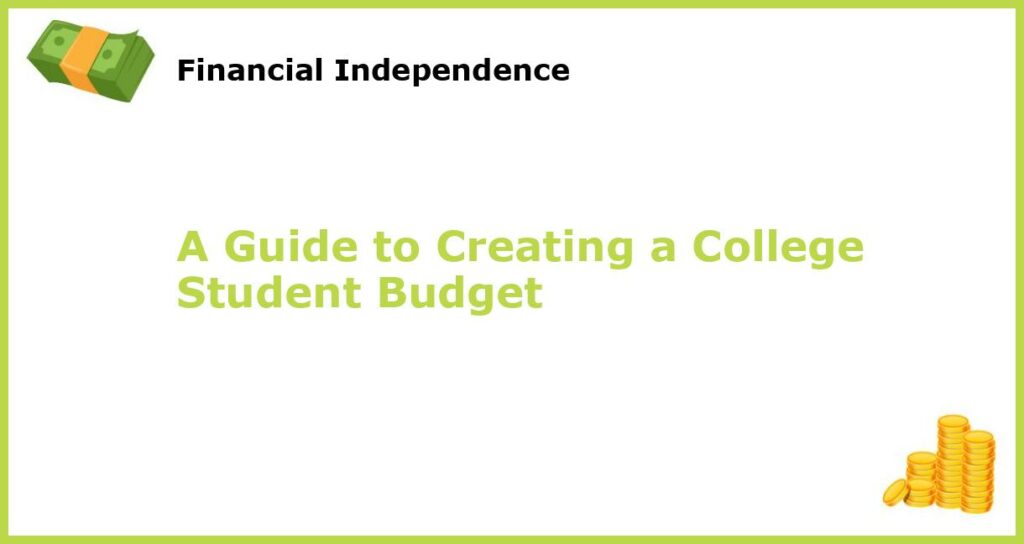College can be an exciting time, but paying for expenses like tuition, textbooks, rent, and food can add up quickly. Creating a budget is essential to managing your finances and achieving your financial goals. Here are some tips to help you create a college student budget:
Expenses to Consider

When creating a budget, it’s important to consider all of your expenses. Tuition and textbooks tend to be the biggest expenses, but you should also factor in rent, utilities, transportation, food, entertainment, and any other necessary expenses. Keep track of what you spend each month by using a budgeting tool or creating a spreadsheet. Review your expenses regularly and adjust your budget as needed.
To break it down further, consider your rent expenses. Do you have a roommate/s? Do you live on-campus? Do you have utility expenses? Utilities can include electricity, water, gas, Internet, or a landline phone. Transportation expenses can also vary depending on whether you have a car or use public transportation to get to school. Food expenses can be broken down further into categories such as groceries, eating out or ordering takeout, and coffee runs. Entertainment can also include streaming services, concerts, or movies. Be sure to factor in any other expenses you have that could impact your budget.
Setting Realistic Goals

Make sure your budget is realistic and achievable. Don’t set goals that are too high or too low. Consider your current income, expenses, and lifestyle when creating your budget to make sure it works for you.
For example, consider your income streams. Do you have a part-time job or do you receive financial aid or a scholarship? What is your expected income for the entire semester or academic year? Consider also your lifestyle. Are you frugal or are you a spender? Do you already have pre-existing extracurricular activities that require additional fees? Be honest with yourself and try to come up with a balance that works for you.
Choosing the Right Tools

There are many budgeting tools available, such as mobile apps, spreadsheets, and online planning tools. Choose the tool that works best for you and your lifestyle. Make sure to use it regularly to stay on track.
Consider tools such as Mint or PocketGuard, which can help you track your expenses, pay your bills, and create a budget. If you prefer to use a spreadsheet, Google Sheets or Excel can help you create a customizable budget worksheet. Online planning tools like YNAB can also help you create a customized budget and give personalized recommendations to help you reach your financial goals.
Saving Money on Textbooks

Textbooks can be a major expense for college students. Look for ways to save money, such as purchasing used textbooks, renting textbooks, or purchasing digital versions. You can also consider sharing textbooks with classmates.
In addition to buying used or electronic textbooks or renting from bookstores, consider asking upperclassmen or checking online marketplaces such as Amazon, Chegg, and Textbooks.com for deals. You might also consider buying international versions or textbook editions from other countries as they tend to be cheaper. If you decide to share textbooks with classmates, be sure to communicate and coordinate with them regarding sharing schedules and deadlines for returning them.
Cutting Back on Food Expenses

Food is another major expense for college students. Consider meal planning and grocery shopping to save money. You can also look for student discounts or consider cooking meals with friends to split costs.
Meal planning means you kindly write down or input in your budget tool your meals for the entire week or month. You can include a meal prep day where you cook meals beforehand so you don’t have to spend a lot of time cooking or dining out throughout the week. Look for student discounts and coupons from your favorite restaurants, cafes, and grocery stores. Whenever possible, try to eat at home or cook with friends to save money on meals.
Earning Extra Income
Consider earning extra income to supplement your budget. Look for on-campus jobs or part-time jobs off-campus, such as working in retail or food service. You can also consider freelance work or tutoring to earn extra money.
Work-study programs allow students to earn money while studying, and they also give you work experience that could boost your resumé. Check with your school’s career center for job-openings on and off campus. Other job options available for students include food delivery, ridesharing, and freelance work as graphic designers, editors, or writers. If you have a skill that you excel at, consider offering tutoring or coaching services to other students who may need extra help.
Tracking Expenses

Tracking your expenses is essential for staying on budget. Use your budgeting tool to track your spending each month. This will help you identify areas where you are overspending so you can make adjustments as needed.
Be honest with yourself when tracking expenses. If you’ve overspent on food, entertainment, or other categories, don’t beat yourself up. Instead, try to analyze your expenses critically and identify areas where you can make cuts so you can stay on track. If nothing can be cut out of your expenses, consider finding ways to earn extra income to supplement your budget. Also, set limits or “ceilings” for each specific category in your budget, an example in which the monthly expense on entertainment would be capped at $100.
Managing Your Credit
Manage your credit responsibly to avoid overspending and accumulating debt. Make sure to pay all bills on time and keep your credit utilization low. Consider getting a credit card with a low limit to help build credit without overspending.
If you already have a credit card, keep track of your balance and set reminders for bill payments. Don’t exceed your credit limit, and try to pay your bills in full whenever possible to avoid accumulating debt. If you don’t have a credit card yet, consider signing up for one with a low credit limit to start building credit. Remember to review your credit report regularly to make sure there are no errors or fraudulent activities listed.
Sticking to Your Budget
Sticking to your budget requires discipline and commitment. Avoid impulse purchases and prioritize your expenses. Consider creating a savings account to help you reach your financial goals.
Try to stay motivated by setting specific financial goals, such as saving up for a summer vacation, a new gadget or a future event. Set up automatic savings and bill payments so you don’t forget to contribute. Also, learn how to say “no” to yourself by avoiding unnecessary shopping sprees and dining outs. Take breaks and make sure to treat yourself every now and then to stay on track and maintain a healthy balance between spending and saving.
Reviewing and Adjusting Your Budget
Review your budget regularly to make sure it is still working for you. Adjust your budget as needed based on changes in income or expenses. Remember, budgeting is an ongoing process that requires flexibility and adaptability.
You will always encounter certain months with more or less expenses than usual. Be adaptable and don’t beat yourself up if you need to make minor or major adjustments to your budget. If your expenses have increased, look for areas in your budget where you can cut back. If your income has increased or you have gotten a raise, consider allocating the added financial support to savings or retirement contributions. Regularly reviewing and tracking your budget will help you stay well-informed and well-prepared to manage college expenses. Congratulations on being a financially responsible and savvy student!







